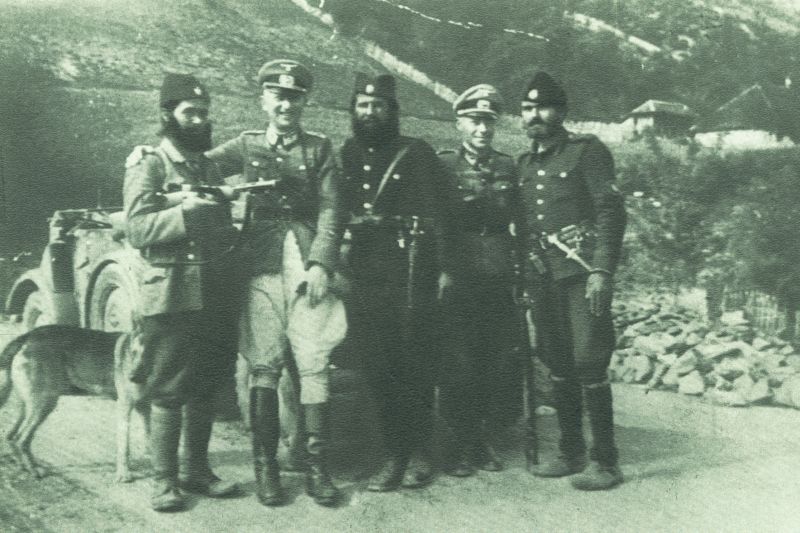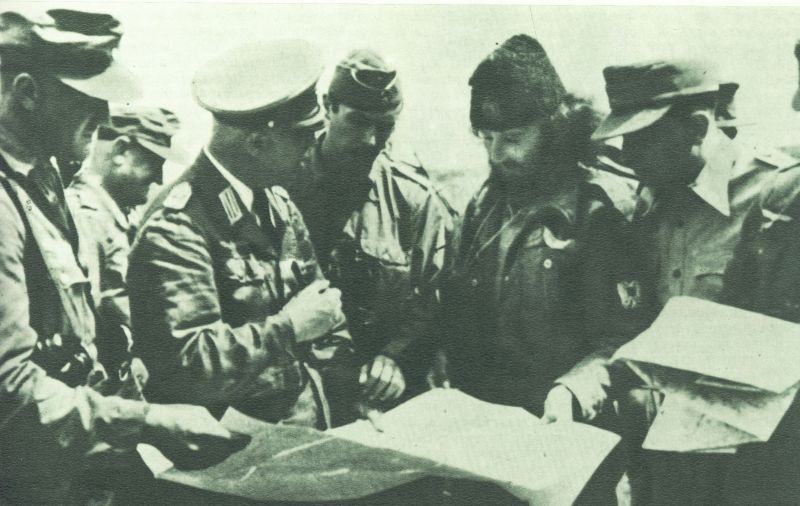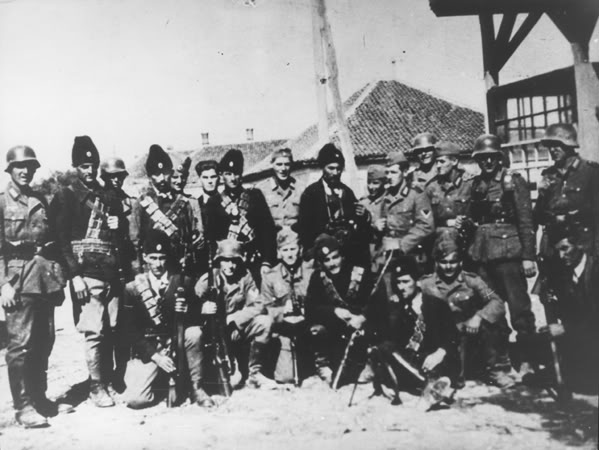Serbian Crimes Against Jews and Others in World War II
Jewish survivors testified that the Serbian Chetniks (Nazi collaborators in World War II), particularly those under the command of Draza Mihailovic, ‘persecuted Jews mercilessly’ and slaughtered them ‘in a bestial way.’… Banjica survivors reported that the Belgrade Special Police and the Serbian State Guard were responsible for executions and that the victims included children. Whatever it took to gain Greater Serbia was what the Serbs willing to do, including the massacre of Jews.

PHOTO: Serbian Chetniks with Nazi German Officers, Jablanica 1942. The Chetniks’ struggle with the invaders came to a complete stop at the end of 1941, and gradually evolved into cooperation with the Italian Fascists and the German Nazis. According to Yad Vashem Holocaust Memorial in Israel, 'As the Chetniks increased their cooperation with the Germans, their attitude toward the Jews in the areas under their control deteriorated, and they identified the Jews with the hated Communists. There were many instances of Chetniks murdering Jews or handing them over to the Germans.'

PHOTO: Serbian Chetniks with Nazi Germans, Zajecar 1944. The Chetniks’ struggle with the invaders came to a complete stop at the end of 1941, and gradually evolved into cooperation with the Italian Fascists and the German Nazis. According to Yad Vashem Holocaust Memorial in Israel, 'As the Chetniks increased their cooperation with the Germans, their attitude toward the Jews in the areas under their control deteriorated, and they identified the Jews with the hated Communists. There were many instances of Chetniks murdering Jews or handing them over to the Germans.'
Serbian Crimes Against Jews and Others in World War II
By Jeanne M. Haskin
Author of Bosnia and Beyond: the”quiet” revolution that wouldn’t go quietly (2006, Algora Publishing)
In Serbia’s secret War: Propaganda and the Deceit of History, Philip J. Cohen and David Riesman have a lot to say about Serbian collaboration with the Nazis. It began long before their occupation and before the signing of the Tripartite Pact, as is typical, with a series of anti-Jewish tracts and statements. The fascist entity Zbor, for example, published a tract entitled “Serbian People in the Claws of the Jews,” which urged that “Jewry has to be quickly and energetically liquidated, because otherwise the destruction of Christian civilization is inevitable.”
Other publications, including one entitled ‘Obnova,’ proclaimed that Jews were the ancient enemies of the Serbian people and that the Serbs should not wait for the Germans to begin the extermination of the Jews. What is more, Patriarch Varnava, the head of the Serbian Orthodox Church, “met with German journalists in January 1937 to express his ‘vivid interest’ in the new Germany and to praise Hitler for leading a ‘battle which serves all humanity.’”
There were several fascist organizations installed in occupied Belgrade with the complete and total cooperation of the Serbs there. These included “the Nazi-backed regime of Gen. Milan Nedic, the Serbian fascist movement Zbor, and various Serbian state security forces, including the Serbian State Guard, the Serbian Volunteer Corps, the Belgrade Special Police, the Serbian Gestapo, as well as the Chetnik guerrilla bands of Kosta Pecanac and the Chetniks of Draza Mihailovic.” Nor was their range limited to Serbia. In pursuit of an expanded and ethnically pure “Greater Serbia,” these organizations operated in Slovenia, Croatia, Bosnia-Herzegovina, Montenegro, and Macedonia. Read more
The Institute for Research of Genocide of Canada (IRGC) marks Holocaust Memorial Day
Ignoring the historical fact of the World War ll Holocaust increases the risk that it will be repeated
Holocaust Memorial Day is commemorated on 27th January every year and observed all over the world, in memory of all victims of World War II Holocaust.
IRGC opened on January 27, 2022 on the International Day of Remembrance for all victims of the Holocaust, as an important reminder of the universal study of that - and any future genocidal - Holocaust, a unique evil which cannot simply be permitted to slip quietly into the past and eventually oblivion. Read more
The Chetniks and the Jews
Photo: Draza Mihailovic’s Serbian Nazi-collaborating Chetniks with Germans in World War II.
Republished with permission from Greater Surbiton Blog.
Author: Dr. Marko Attila Hoare
Last week, the Serbian daily Blic published another contribution to the long-running efforts of anti-Communist Serb nationalists to rehabilitate the Nazi-collaborationalist Serbian Chetnik movement of World War II. Such efforts represent an affront to the Serbian anti-fascist heritage and to all those who survived the Chetniks’ crimes. I am therefore publishing here an extract from my book Genocide and Resistance in Hitler’s Bosnia: The Partisans and the Chetniks, 1941-1943, Oxford University Press, Oxford, 2006 (pp. 156-162) that illustrates the anti-Semitic and genocidal character of the Chetnik movement.
As the Chetnik-Partisan breach widened, Chetnik propaganda laid increasing stress on the allegedly ‘non-Serb’ character of the Partisans. From the start, Chetnik leader Draza Mihailovic portrayed the Communists as an ethnically alien, non-Serb element. In negotiations with the Germans in November 1941, in the course of assuring the latter that ‘it is not my intention to fight against the occupiers’, Mihailovic claimed that ‘I have never made a genuine agreement with the Communists, for they do not care about the people. They are led by foreigners who are not Serbs: the Bulgarian Jankovic, the Jew Lindmajer, the Magyar Borota, two Muslims whose names I do not know and the Ustasha Major Boganic. That is all I know of the Communist leadership.’ (1) Rhetoric of this kind was rapidly adopted by the Bosnian Chetniks and became more virulent as their conflict with the Partisans intensified. Chetnik propaganda stressed in particular the presence in Partisan ranks of Muslims and Croats, some of whom were allegedly former Ustashas. A bulletin issued by the staff of Bosko Todorovic, the Chetnik commander of Operational Units for East Bosnia and Hercegovina, probably in January 1942, spoke of ‘the leaders of the Partisans from Montenegro, among whom an important role is played by JEWS, TURKS and CROATS’ [emphasis in original].(2) A bulletin issued from the same source in February spoke of ‘a shock detachment of Montenegrin Partisans, under the command of someone called Vlado Segrt, filled with criminal-Ustasha Turks from Hercegovina, some of whom had until recently been throwing our brother Serbs into pits’.(3) Read more
U.S. Holocaust Museum Marks Srebrenica Genocide
Fifteen Years Later: Forward or Backward in the Balkans

Date: Thursday, July 15, 2021
Time: 2:00pm - 6:00pm
Location: United States Holocaust Memorial Museum
Street: 100 Raoul Wallenberg Place, SW
City/Town: Washington, DC Read more
The IRGC Invited to the Canadian Parliament to Discuss How Canada Can Further Contribute to Preventing Genocide
At the invitation of Paul Dewar, Chair All-Party Parliamentary Group in Canadian Parliament for the Prevention of Genocide and Other Crimes Against Humanity, the representatives from the Institute for the Research of Genocide Canada are invited to attend a round table discussion Read more
Ending Our Age of Suffering - A plan to stop genocide
Daniel Jonah Goldhagen
Daniel Jonah Goldhagen, the Harvard professor and author of the bestselling “Hitler’s Willing Executioners” who examines genocides in Rwanda, Guatemala, Bosnia and the Ukraine and realizes that mass killings continue in the modern age simply because of the rest of the world’s reluctance to stop it. Read more
The International Day in Memory of the Victims of the Holocaust
Today, we commemorate the millions of victims of Nazi persecution. We solemnly reflect on the massacre of nearly one third of the Jewish people and countless other minorities. We gather here today, united by a common responsibility, to never allow those who suffered atrocious acts of discrimination, deprivation, cruelty, and murder, fade in vain with the sands of time. To this end, Holocaust education has provided us with an exemplary model of how humanity can unite to honour the victims of persecution, and give them a permanent place in our collective memory. Read more
Adding Insult to Injury: Washington Decorates a Nazi Collaborator
By Dr. Marko Attila Hoare
The sixtieth anniversary of the defeat of Nazi Germany is not, one might imagine, the time when one would expect the US government to decorate Nazi collaborators. But one would be wrong. Last month, a delegation of US war-veterans posthumously presented the Legion of Merit to Serbia’s General Dragoljub ‘Draza’ Mihailovic, leader of the ‘Chetnik’ movement during World War II; a convicted war-criminal and Nazi collaborator. Read more
History of Anti-Semitism in Serbia
Helsinki Committee for Human Rights in Serbia
(Annual Report 2001, Annex 1)
Ouster of Slobodan Milosevic in October 2000 did not lead to a complete break with the legacy of his regime. Aside from a continuing formal-legal framework and mechanism of power, the persisting legacy is mirrored in non-relinquishment of the (defeated) Greater Serbia Project, nationalism, denial of recent crimes and atrocities, and reluctance to face up to recent wartime responsibility. Read more
Involvement of Serbs in the Holocaust of Jews
Holocaust History Misappropriated
Mindstream: A Monthly Jewish Review. Volume XXXVIII No.8. November 1992.
By: Dr. Philip J. Cohen
In conjunction with the war in former Yugoslavia, Serbia has undertaken a campaign to persuade the Jewish community of Serbian friendship for Jews. This same campaign portrays Croats as a common threat to both Jews and Serbs, in an attempt to gain Jewish sympathy and support at a time when most nations have isolated Serbia as a Balkan pariah. However, even as Serbia courts Jewish public opinion, their propagandists conceal a history of well-ingrained antisemitism, which continues unabated in 1992. To make their case, Serbs portray themselves as victims in the Second World War, but conceal the systematic genocide that Serbs had committed against several peoples including the Jews. Read more


